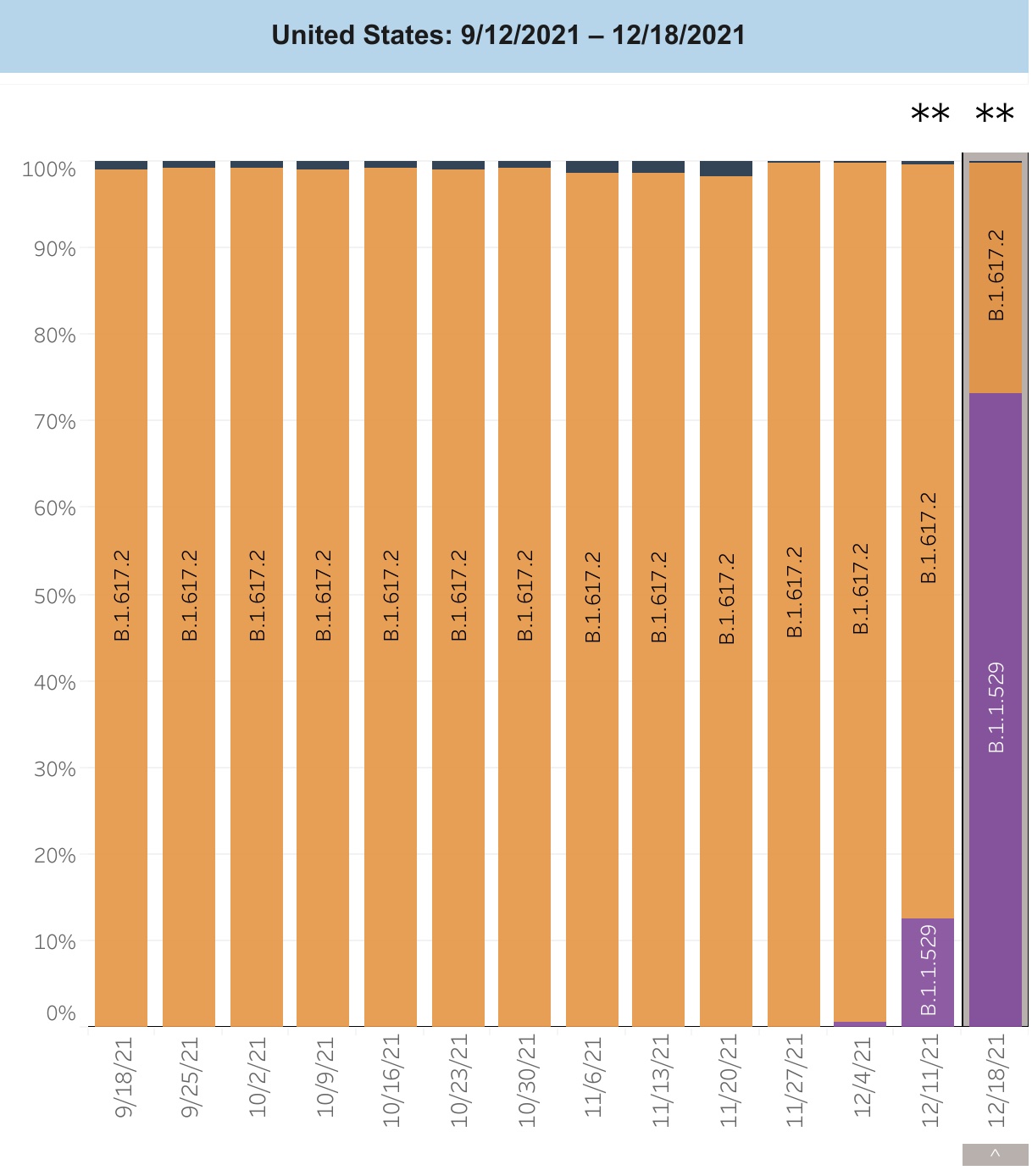The Omicron Surge: Putting a number on fear

I’m getting loads of questions and hearing more pandemic conversation than I’ve heard in months. Here is my first post addressing some of the latest issues. At the top of the list is the omicron surge and what to do about Christmas. There are multiple aspects to this. Today I want to start with quantifying personal risk. This is not intended to ignore community risk, which is hugely important (and I’ll get to that). My goal is to put things in perspective for anyone who is personally afraid of COVID.
My vaccination is up to date but I’m still afraid
The US-made mRNA vaccines from Moderna and Pfizer are miraculous, on an Apollo moon landing scale of wonder. They are extraordinarily effective at preventing death and severe COVID disease. If you are under age 65 and in reasonable health, being up to date with your COVID vaccination (now the original series plus a booster) means your chance of landing in the ER because of COVID is much smaller than the chance you’ll go there after a car crash—even during a surge.
This is true for the original SARS-CoV-2 virus and all subsequent variants to date, including delta and omicron. My opinion is that this will remain largely true for any future variant as well, because of acquired immunity and because the virus can only change so much without hurting itself.
How much is my risk of dying of COVID?
Let’s try to put a rough number on it, starting with my age group (50-64). Here are some numbers for weekly death rate by age from ordinary stuff:
Source CDC; I divided the annual data from 2019 by 52 to approximate weekly death rates
Deaths from diseases of the heart, Americans age 50-64: 3 (per 100,000 people per week)
Deaths from cancer, Americans age 50-64: 4 (per 100,000 people per week)
Deaths from accidents/unintentional injuries, Americans age 50-64: 1 (per 100,000 people per week)
COVID death rates have fluctuated over a wide range with each wave of the pandemic.
In the last six months, deaths from COVID in 50-64 age group (per 100,000 people per week) peaked at >18 around August 28
{source CDC “greater than” 18 because the data I’m using do not include partially immunized people, only those who were either unvaxxed or fully vaxxed).
Take home point: During the August surge, COVID was killing more Americans age 50-64 than the top ten other leading causes of death combined.
How well do vaccines protect against death?
Using that same week around August 28, let’s break out death rates among unvaccinated 50 to 64-year-olds versus those who were up to date with their COVID vaccine.
COVID deaths, unvaccinated Americans age 50-64: 18 (per 100,000 people per week)
COVID deaths, Fully Vaccinated age 50-64: 0.7 (per 100,000 people per week)
COVID deaths in this age group were overwhelmingly skewed toward the unvaccinated.
Take home point: If you’ve had the full set of inoculations and you’re under age 65, you personally should not be more afraid of COVID than you are of dying in a freak accident. Make choices based on your responsibility to more vulnerable people.
Age 65-79
The rules are different for seniors.
Up to date vaccination (which, after omicron, now includes a third dose of mRNA vaccine) greatly reduces risk, but not to zero. How much is the risk compared to other causes of death?
Deaths from diseases of the heart, Americans age 65-79: 9 (per 100,000 people per week)
Deaths from cancer, Americans age 65-79: 12 (per 100,000 people per week)
{source CDC 2019 data}
How does that compare to COVID death rates in this age group?
In the last six months, deaths from COVID (per 100,000 people per week) peaked at >57 around August 28 for people ages 65-79. {source CDC}
Take home point: COVID is much more dangerous for this age group than age 50-64 (rate of 57 vs 18). During a surge, COVID kills far more seniors than the usual top causes of death.
How well do vaccines protect seniors against death?
Using that same week around August 28, let’s break out death rates among unvaccinated seniors versus seniors who were up to date with their COVID vaccine.
COVID deaths, Unvaccinated age 65-79: 54 (per 100,000 people per week)
COVID deaths, Fully Vaccinated age 65-79: 3 (per 100,000 people per week)
Take home point: Even in the worst part of a surge, for people under age 80, vaccines reduced the risk of dying of COVID to a level much lower than their risk of dying of more mundane diseases. On the other hand, unvaccinated seniors were far more likely to die of COVID than of anything else.
Age 80+
The older you are, the greater your COVID risk. Let’s look at COVID death rates for Americans age 80 and over. Same data source, same week (August 28):
COVID deaths, Unvaccinated age 80+: 60 (per 100,000 people per week)
COVID deaths, Fully vaccinated age 80+: 12 (per 100,000 people per week)
Comparison, age 80+ in 2019: Weekly death rates cancer (27) and heart disease (50). {CDC}
Take home point: Vaccine effectiveness declines in the very old, but vaccines still help a lot. At the peak of a surge, vaccinated people over age 80 were less likely to die of COVID than other common diseases.
What about the omicron surge?
The omicron variant is several times more contagious than delta, which itself was several times more contagious than earlier variants. In less than one month, omicron has gone from zero to 75% of all new cases in the US. {see the shocking figure above from CDC}.
Because omicron is so contagious, new cases in the US are rising fast. {see data at NYT} Within a few days we should exceed the August surge.
The death rates I quoted above depend on how widespread the virus is in the community. As omicron drives a big increase in the number of cases, we can expect that a few weeks later, we will also see COVID death rates go up. Right now, about 1,300 Americans are dying of COVID every day. That number is rising.
The unvaccinated will bear the brunt of the suffering. As far as we can tell, the American mRNA vaccines protect against severe disease and death from the omicron variant. Boosters further enhance that protection, and by boosting antibody levels, they also reduce breakthrough cases and transmission.
I predict that despite the mayhem that is likely to hit in the next few weeks, personal risk of severe COVID for people who are up to date with their vaccine and are under about age 75 will not change much. Unfortunately, we will see more deaths among the oldest Americans who are fully vaccinated because their immune systems just don’t respond as well. For all of 2021, vaccination in age 65-79 has consistently given about 20-fold protection; in age 80+, vaccination has reduced risk of death by about 5 times. So a rise in the total number of COVID cases–including mild and asymptomatic–will disproportionately impact the very old.
This has public health and policy implications: topic for another day.
Final point: This entire post focused on the worst case—dying of COVID. Vaccinated people have good news there. Unfortunately the news is less good with omicron and mild illness. Breakthrough infections in fully vaccinated people appear to be more common with the omicron variant. So your risk of getting a flu-like illness from the coronavirus is higher now than a month ago before omicron emerged. But actual flu and countless other common viruses are also on the march this season, so only testing can tell whether your symptoms are from the SARS-CoV-2 coronavirus.
Amy Rogers, MD, PhD, is a Harvard-educated scientist, novelist, journalist, and educator. Learn more about Amy’s science thriller novels at AmyRogers.com.


